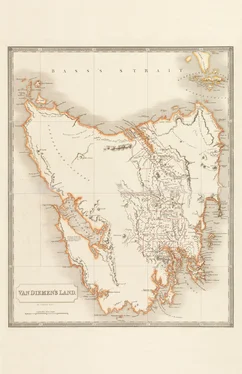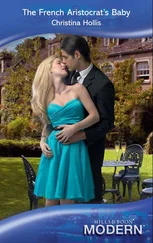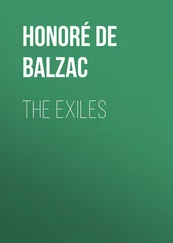“Does it seem healthy?”
“If the mother is healthy, the child should be too.” Looking her over, he said, “You’re underweight and your skin is sallow, but your eyes are clear.” Placing the wider end of a hollow wooden tube against her chest, he inclined his ear toward the other end.
When he removed it, Evangeline asked, “What is that for?”
“It’s a way to check for tuberculosis, or what we used to call consumption. The scourge of any ship. You show no signs of it.”
“And if I did?”
“Back to Newgate, into quarantine.”
“No transport?”
“Certainly not.”
“Perhaps I’d be better off.”
He set the tube on a shelf behind him. “The voyage is a long one. And convict life is, no doubt, a . . . trial. But transport can, for some, be an opportunity.”
“It will be a long time until I’m free.”
“It will. But you’re young. And with good behavior you may earn your ticket of leave sooner. The most important thing is not to succumb to despondency. ‘Though much is taken, much abides.’”
“‘Made weak by time and fate, but strong in will,’” she said, almost without thinking.
He raised an eyebrow. “You’ve read Tennyson?”
She blushed. “I was a governess.”
“How . . . unexpected.” He gave her a funny smile, as if he couldn’t quite absorb this bit of information. Then he stepped back. “Well. I suppose I must inspect your fellow travelers.”
“Of course.” She straightened her apron. She felt a little lightheaded, as if emerging from a trance.
Ascending the rope ladder to the main deck, she thought of those children’s tales in which humans are transformed into frogs and foxes and swans, and only when someone recognizes them for who they truly are is the spell finally broken.
That was what this felt like: a faint glimmer of recognition.
Medea , The Port of London, 1840
Within a few days the convicts’ routine was established. They were roused at six in the morning by a series of bells and the unbolting of the hatch, a shaft of light piercing the darkness. Evangeline would lie in her berth for a few minutes listening to the slap of water against the hull, feeling the tug of the ship against the anchor that moored it, beams creaking as it rolled. Women waking, chattering, groaning. Squalling babies. Olive slept heavily, snoring above her, seldom woken by the bell, so Evangeline got in the habit of rapping on the bottom of her bunk until Olive groused, “All right, all right, I hear ye.” They dressed quickly, tucking tin cups and bowls and spoons into apron pockets. Unless it was raining, the prisoners were expected to bring their blankets up the ladders to the main deck, where they’d hang them on netting to air.
After breakfast they queued for the surgeon to inspect their eyes, look inside their mouths, pour a thimbleful of lime juice mixed with a little sugar and wine into their cups, and watch them drink it. “For scurvy,” he said. “It’s sour, but better than losing your teeth.”
Though it was a new experience for her, Evangeline had adjusted fairly easily to working for the Whitstones in St. John’s Wood, deferring to them and submitting to their whims. She, and they, existed within a clearly defined social order. But she had little familiarity with people who were gratuitously cruel, driven by anger or boredom or revenge. People who got away with bad behavior because they could.
The sandy-haired sailor, she learned, was named Danny Buck. The sailors called him Buck. It was rumored he’d slit a woman’s throat. He’d been sentenced to transport himself, as Olive had guessed, and became enamored of the sea on his own crossing. As soon as he’d served his time, he signed on to a crew that sailed back and forth between London and Hobart Town, the port city in Van Diemen’s Land, Australia, ferrying female convicts.
One foggy morning, scrubbing the deck on her hands and knees, Evangeline heard voices from across the water. She stood and went to the railing. It had rained through the night; the water was the same dull hue as the sky and the air smelled of rotting fish. Shielding her eyes with her hand, she could barely make out the skiff leaving the dock. As it got closer, she could see Buck and another sailor in the middle seats, flanked by four women huddled like pigeons against the damp.
The skiff bumped against the ship and the women were unloaded. One by one they plodded up the ramp, their chains clinking. The first, plump and disheveled, appeared to be in her thirties. The next two were close to Evangeline’s age. The final girl was much younger. She was ghostly pale, with unruly copper hair gathered in a loose bun against her neck—the only spot of color in the drab scene. Looking neither at Buck nor at the small crowd lining the railing above, she stared resolutely ahead, stepping carefully in her chains like a dancer to avoid the thick treads. She wore boys’ breeches, tied with a cloth belt, and was as fine-boned as a sparrow.
Buck, walking close behind her, thwacked the girl’s backside with his palm. She stumbled forward, barely catching her footing. “No dallyin’,” he said, kissing his fingers and winking at the men above, who whistled and clapped.
The girl stopped. He came up short, bumping into her.
She turned slowly to face him, her chin thrust forward. Evangeline couldn’t see her face or hear her words, but she watched Buck’s smug leer vanish.
As the girl turned back around and continued up the ramp, Buck’s expression changed again, from blank consternation to anger. Gripping the railing, Evangeline called, “Watch out!” but her voice was swallowed in the tumult.
When the girl reached the deck, Buck shoved her hard, and, tripping on her chains, she sprawled forward. She couldn’t raise her arms to protect her face, but at the last second she twisted to the side, closing her eyes as she fell with a sickening thud.
Someone gasped. The hooting stopped. The girl lay still. Evangeline watched Olive push through the sailors and prisoners gathered around the prone body, and, kneeling, lift the girl to a sitting position, one arm around her shoulders. One side of her head was matted with blood, deep red, staining her curls and running down her neck.
Buck jumped lightly onto the deck. “Such a clumsy one,” he said, nudging the girl’s leg irons with his foot.
A few sailors laughed.
The girl’s eyelids fluttered. With an arm around her back, Olive helped her to her feet. Evangeline could see the knobs of her backbone beneath her thin blouse and a small crescent moon tattooed in blue and black on her neck. She was quivering like an aspen. Olive’s dress was smeared with blood.
“What happened here?” the surgeon asked, coming toward them.
Wordlessly the sailors dispersed, avoiding his eyes.
“Mr. Buck?”
“Seems the prisoner lost ’er balance, officer.”
Dr. Dunne glared at Buck, as if wanting to reprimand him but not finding enough cause. He exhaled through his nose. “Get the locksmith.”
“Will do, officer.”
“Do it now, seaman.” Dr. Dunne motioned for Olive to step away. Crouching down in front of the girl, he said, “What is your name?”
“Don’t matter.”
“I’m the ship surgeon. Dr. Dunne. I need to know.”
She stared at him for a long moment. “Hazel.”
“Hazel what?”
“Ferguson.”
“Where are you from?”
She paused again. “Glasgow.”
“May I?” He held his hands up, as if surrendering, then reached toward her, fingers spread. She let him cup her face. He turned her head this way and that, inspecting it. “Does that hurt?”
“No.”
“The wound needs cleaning. As soon as you get these irons off, I’ll take a closer look.”
Читать дальше












